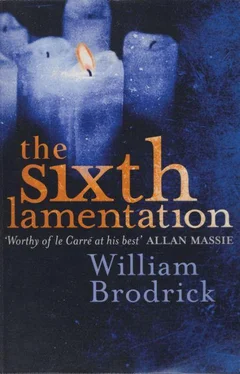William Brodrick - The Sixth Lamentation
Здесь есть возможность читать онлайн «William Brodrick - The Sixth Lamentation» весь текст электронной книги совершенно бесплатно (целиком полную версию без сокращений). В некоторых случаях можно слушать аудио, скачать через торрент в формате fb2 и присутствует краткое содержание. Жанр: Триллер, на английском языке. Описание произведения, (предисловие) а так же отзывы посетителей доступны на портале библиотеки ЛибКат.
- Название:The Sixth Lamentation
- Автор:
- Жанр:
- Год:неизвестен
- ISBN:нет данных
- Рейтинг книги:5 / 5. Голосов: 1
-
Избранное:Добавить в избранное
- Отзывы:
-
Ваша оценка:
- 100
- 1
- 2
- 3
- 4
- 5
The Sixth Lamentation: краткое содержание, описание и аннотация
Предлагаем к чтению аннотацию, описание, краткое содержание или предисловие (зависит от того, что написал сам автор книги «The Sixth Lamentation»). Если вы не нашли необходимую информацию о книге — напишите в комментариях, мы постараемся отыскать её.
The Sixth Lamentation — читать онлайн бесплатно полную книгу (весь текст) целиком
Ниже представлен текст книги, разбитый по страницам. Система сохранения места последней прочитанной страницы, позволяет с удобством читать онлайн бесплатно книгу «The Sixth Lamentation», без необходимости каждый раз заново искать на чём Вы остановились. Поставьте закладку, и сможете в любой момент перейти на страницу, на которой закончили чтение.
Интервал:
Закладка:
Lucy put the notebook to one side. She was unable to move. Her eyes swam out of focus. Eventually she stumbled into the kitchen. From behind the microwave she fished out a packet of Camel, bought the same day Darren had left her to go back to the wife and kids she hadn’t known about. She’d thrown them unopened across the room when she’d got back from the corner shop. Lucy lit up her first cigarette on the gas cooker, singeing her eyebrows. Sitting on the floor of the living room with a side plate for an ashtray, she smoked and grimaced, calmed by the sudden punch of nicotine.
In reading her grandmother’s story a kaleidoscope had turned, and almost everything Lucy knew about Agnes had tumbled out of place and fallen into a new configuration. Memories of peculiar things her grandmother had said and done in the past, making sense now, burst across her mind. Like that shopping trip after Christmas to the Army and Navy store in Victoria Street. They’d walked across the piazza facing Westminster Cathedral as the sound of the choir had filtered through the open doors. Agnes had suddenly turned and gone inside. She’d sat at the back for something like half an hour. Mosaics had glittered in the distance, and a boy’s voice had spiralled between pillars that rose to hold the darkness overhead. As they were leaving Agnes had said cheerlessly, ‘The Feast of the Holy Innocents. ‘
‘What’s that, Gran?’
‘The remembering of a great slaughter. After the birth of Christ, King Herod wanted him killed. He didn’t know where he was so he ordered the massacre of all children under the age of two.’
‘How many was that?’
‘Two thousand.’
‘What about the one they were after?’
‘Warned beforehand, by an angel. The family escaped.’
‘Why not warn all the others?’
‘A very good question.’
Lucy looked at her gran enquiringly ‘How do you know all that?’
‘A decent education.’
‘Do you believe any of that stuff? God, angels, three wise men?’
Agnes hadn’t replied immediately She’d slipped her moorings, as she was prone to do when loosened by an unspoken memory. ‘Sometimes I think it’s homesickness. But you can’t get back.’
Lucy hadn’t taken the matter further, but Agnes’ remarks had stayed in her mind. Now she understood.
During her third cigarette, lolling but seasick on rising waves, she ran for the toilet and vomited. Lucy faced the mirror. She studied her black hair, the colourless oval face, the translucent skin, those dark lashes that always got her into trouble. She was a stranger to herself.
Lucy made a large mug of tea with two heaped teaspoons of sugar, to help swallow the unpalatable. Her mind turned bitterly to Schwermann, who lay protected in a monastery, and to Victor Brionne, the man of fine words, the collaborator who’d betrayed Agnes. But how did he get away after the war? Who on earth could have wanted to help a man deaf to the cries of children?
She poured the tea down the sink and made her way back to bed, knowing that a different person would see the morning. Her old self had closed her eyes for ever. Lucy glanced at the notebook lying open on the floor. What has happened, she thought, in my growing up that I can read such things and not even cry?
Chapter Seven
The first notebook of Agnes Embleton.
3rd April 1995.
Dear Lucy, I have just seen the face of the man who took away my life, on the very day Doctor Scott said I was going to die. I sensed that months ago, when the voices and faces of my youth came back, like rooks coming home. I should have known Schwermann would turn up as well.
I would have liked to talk to you about me, and my childhood friends, but I’m not able. Soon I’ll be gone and I do not want their memory to go with me. The time has come for you to know everything.
10th April.
I’ve often wondered why the path of my life diverged from what I hoped for, and sent me on track for what I got. But there’s no point in seeking explanations. There are no ‘might have beens’. So I look to London, and my birth in March 1919.
My father was French and came to England in 1913 to work in a bank. He met my mother, who was Jewish, at a work function. She was the daughter of a regional manager. Within the year they were married, and then I came along. They used to say I was the second great blessing of their life. The first was to have escaped the war. My earliest memories are of playing upon Hampstead Heath, threading daisies, half understanding conversations about ‘The Great War’. Most of the people we knew had suffered loss, and even now the names of those terrible battles conjure up a strange remembrance of warm summer days and other people’s grief. You see, by some miracle (as my father used to say), the war had passed us by while touching all around us. And so I grew up feeling protected, as if God had carefully placed us beyond catastrophe. Until my mother died on 17th August 1929.
From that day my father wanted to go back to France, away from every reminder of her. I wasn’t surprised because England had never become his home. He was always making comparisons, which showed he saw things from the outside. Even the milk was better in France. He began to tell me wonderful things about Paris, and I would go to sleep seeing bridges, a shining river and tables in the street lit by thousands of candles. We set sail in early 1931.
I suppose he wasn’t to know He thought he would simply move back into his old bank. But those were hard times and no positions were available. I know that now. At the time I presumed we had landed on our feet. We lived in a nice flat, I did well at school and I wanted for nothing. I was especially good at the piano and my father bought me a monstrous upright for Christmas. Each week I went to see Madame Klein, my teacher, and each week I came home vowing never to see her again. She was a Jewish widow who lived in a magnificent apartment opposite Parc Monceau. My father told me she was one of the best piano teachers in Paris, and had once been a concert performer. That’s as maybe, I thought. Because every Saturday afternoon I climbed those stairs dreading the scowl that never left her face. I hated every second. I said she couldn’t even play For she nursed her right hand and only touched the keys with her left. My father laughed and sent me back each week. I have never written her name down before, and doing so makes me pause. I see her now as I saw her then, dressed in black silk with a vast coiffure of silver hair. She looks at me over quite useless glasses that seem to be part of her nose, her eyes impossible to read.
Anyway back to my father. I never thought to ask where he worked, or how he could afford lessons from such a lady But I came to recognise he was troubled, despite all his efforts to conceal it from me. Children may not know which questions to ask but they already sense the answers. He started scratching his arms, practically scraping the skin off. Before long it was all over his body He joked it was the lice. So I started itching, and together we’d scratch and scratch, laughing. One morning he said casually he had to go and see the doctor. I was fifteen so that would be roughly 1934. I came back from a school camp three days later and, to my surprise, was met by a young nun who brought me to a hospital. She kept glancing at me when she thought I was looking the other way My last memory of my father is that day, sleeping in a white room with a high ceiling, dressed in a white gown beneath white sheets, and a smell of strong disinfectant. The nun stayed with me, trying to hold my hand. A doctor came in and said my father had widespread cancer, and there was nothing they could do. I was left alone, me on a chair, my father asleep in a bed.
Читать дальшеИнтервал:
Закладка:
Похожие книги на «The Sixth Lamentation»
Представляем Вашему вниманию похожие книги на «The Sixth Lamentation» списком для выбора. Мы отобрали схожую по названию и смыслу литературу в надежде предоставить читателям больше вариантов отыскать новые, интересные, ещё непрочитанные произведения.
Обсуждение, отзывы о книге «The Sixth Lamentation» и просто собственные мнения читателей. Оставьте ваши комментарии, напишите, что Вы думаете о произведении, его смысле или главных героях. Укажите что конкретно понравилось, а что нет, и почему Вы так считаете.












